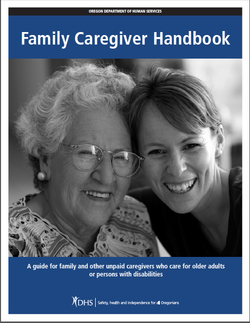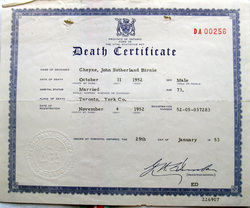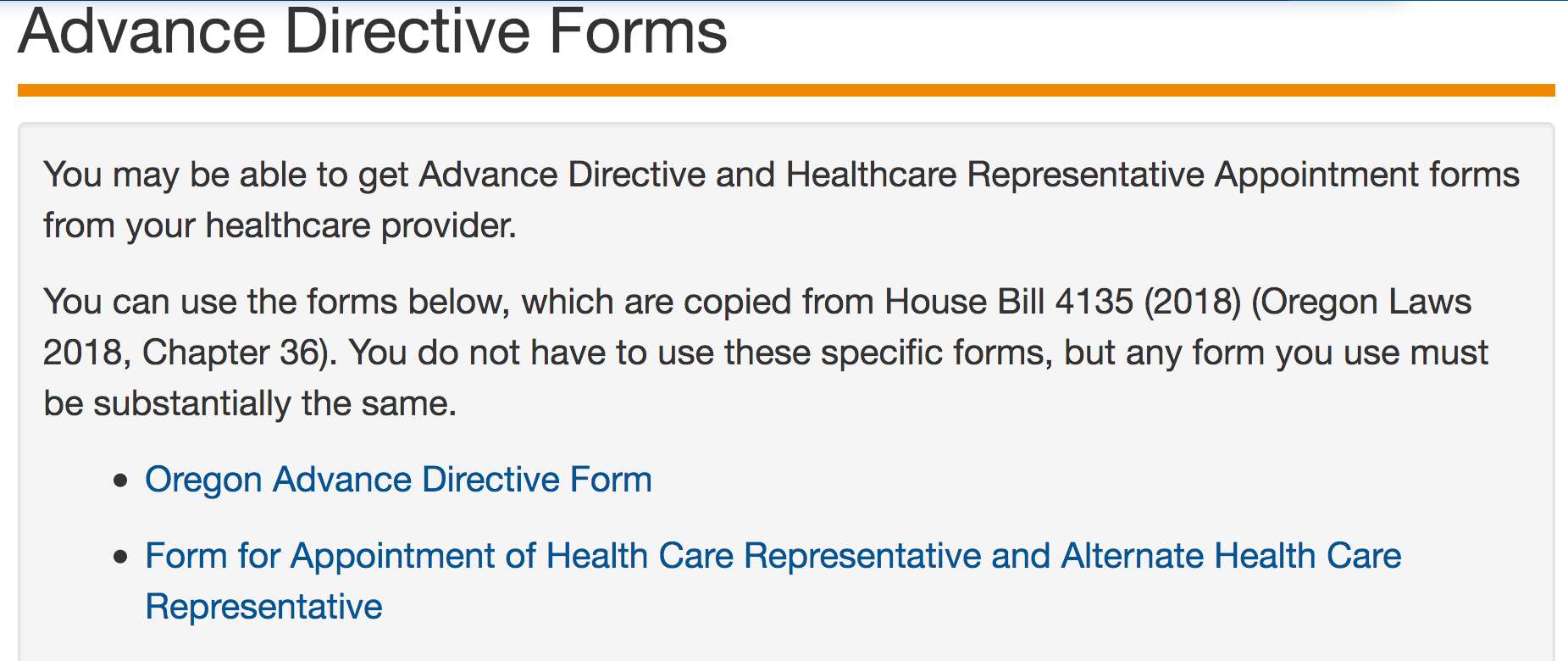Click here to get to page to download the Oregon Advanced Directive form
|
Oregon doesn't call this a "living will" although that might be a term you are familiar with. In Oregon, you can document your wishes and appoint someone to speak for you if you cannot speak for yourself -- that person is called your "Health Care Representative." Use the form from your health care provider or you can download it at the link below (make sure you use the current form, which took effect on 1 January 2019.
Click here to get to page to download the Oregon Advanced Directive form
0 Comments
I am not a bankruptcy attorney, but I have helped many clients understand when they should look into bankruptcy and when there is no need for a bankruptcy filing because the clients have no assets that creditors can reach. If you are concerned that you are drowning in debt and don't know a good bankruptcy attorney to consult, you can make an appointment with my assistant and discuss your situation; I will be happy to refer you to good consumer bankruptcy attorneys if we decide that bankruptcy is appropriate for your situation. Below is another article in the terrific series by the National Consumer Law Center on this important subject. Deciding Whether to File for Bankruptcy: Consumer Debt Advice from NCLC ADRC is a FREE service to help people learn about public and privately paid options to address aging or disability needs, or to help families and caregivers. Anyone in Oregon can use the service for themselves or their families.  Saw a great comment today by a lawyer who is struggling hard to solve a very difficult (and, now, expensive) estate administration problem involving title to real property. The problem was created by the now-deceased parents of his clients; those parents probably saved all of a few hundred bucks on lawyer fees by doing their own estate planning. The lawyer's comment: "You don't always get what you pay for, but you seldom get what you don't pay for."  One of the most common things old geezers like me say when they look back at high school is "Why didn't someone tell me this!?! It would have saved me so much hassle. How come nobody warned me?" If you've reached age 18, grad or not, there are some pretty important things you need to take care of in the legal department. But nearly every young adult has no idea what those key things are. That's why I am offering "Adult Life 101" for all 18 year olds, especially new grads. For just $50, I'll give you some key information and take care of a few "must do" legal things, so you can be better prepared to start the next chapter of your life, whatever direction you go. You can do this on your own, or you can bring your parents or a friend if you want. Call for an "Adult Life 101" appointment.  Oregon Adds Statewide Abuse Reporting Line: (855) 503-SAFE Today we are happy to announce that Oregon has added another option for reporting suspected abuse of children and vulnerable adults. All our regular local hotline and reporting numbers will continue to take reports as usual, but we have added a single statewide number that provides another way to make these important reports. Oregon's abuse reporting hotline for children and adults, (855) 503-SAFE [855-503-7233], is up and running, and it provides callers with the ability to report suspected child abuse, elder abuse, abuse of people with physical or developmental disabilities, and abuse of people with mental illness or those experiencing a mental health crisis. Callers will be directed that if the report is an emergency requiring immediate attention, to hang up and dial 911. If it is not an emergency, then callers will work through a simple phone tree to ensure their report gets to the right place for response, based on zip code and characteristics of the person they are calling about. Calls can be answered in English or Spanish. Once the calls are routed through the phone tree, they will be directed to local DHS or county offices for Child Protective Services and Adult Protective Services, County Developmental Disability Programs (CDDP) or County Mental Health Programs (CMHP) for response. Not all areas of the state will have a live person to take reports after hours, and some locations will provide voicemail reporting options. All local hotline and reporting numbers will continue to take reports as usual, and the new line adds a single call option for those who want to use it. Oregon's abuse reporting hotline for children and adults is the result of two legislative workgroups, one on child welfare and one on elder abuse, which recommended a single hotline option to simplify reporting for Oregonians who are not familiar with the abuse reporting process. Mandatory reporters are often well aware of local reporting and hotlines and are responsible for most of the reports we receive. Citizens who may only make one or two calls in their lifetimes can be overwhelmed by the seeming complexity of agencies and numbers from which to choose. (855) 503-SAFE [855-503-7233] will solve that problem by providing a single phone number anyone can call from any community in Oregon! Good story to remind you of something crucial. Perhaps even more important than your will are all the designations you make over time that pass intangible property (financial accounts most often) outside the will. You should have a day every year where you review these -- the first business day after New Years or your birthday or wedding ( or divorce) anniversary ... Just so that every year you actually eyeball the names of the people who are slated to get the assets in those accounts should you die. There are many horror stories of what happens to survivors of people who fail to do this.
 DHS has a new, free handbook you can download HERE (pdf). If you are an elder thinking about having a family member provide your care, or if you're a family member who is or may someday be asked to provide care for a family elder or other family member with a disability, this is a worthwhile resource.  Prof. Gerry Beyer of Texas Tech posted about the latest in his "Wills Trusts and Estates" blog. He writes: "[R]everse mortgages allow individuals 62 and over to receive money from a bank [now] in return for their home upon their death. . . . Reverse mortgage rules are going to change, which could mean less available funds for borrowers. The changes can also lower the program's high default rate. [New] rules are expected to go into effect as early as October 1. The changes will reduce the number of homeowners that will qualify for reverse mortgages and the maximum amount will be reduced as well. People who apply before October 1 will qualify for the amounts under the rules now. Folks that are considering a reverse mortgage should act quickly if they want the current laws to apply." The always-excellent PBS program "Frontline" focuses its lens on the state of assisted living facilities in America. Spoiler alert: It ain't pretty.
 The second Oregon edition of Preparing for Departure ® will be offered this coming fall 2013, in conjunction with the Unitarian Universalist Congregation of Salem. We are busy updating our material and revising the Oregon-specific provisions we added to the course outline last year with our first Oregon edition. If you want to participate in this limited offering event and to be placed on the mailing list for updates and enrollment information about this powerful, one-of-a-kind course, complete the survey at this link and provide your contact information there: (Survey Link coming soon).  (hat tip to "The Housekeeping Report") NCOA Issues Updated Guide for Seniors Considering a Reverse Mortgage The National Council on Aging (NCOA) today issued the 2013 version of Use Your Home to Stay at Home™, the official reverse mortgage consumer booklet approved by the U.S. Department of Housing & Urban Development (HUD). The guide is designed to help seniors understand the pros and cons of a reverse mortgage. Reverse mortgages allow homeowners who are 62 or older to convert home equity into cash while remaining in the home. Amy Ford, director of NCOA’s Reverse Mortgage Counseling Services Network, called the guide “an older homeowner’s best resource when it comes to examining whether a reverse mortgage is right for them.” A free copy of the guide is available (download the pdf by clicking here).  Lots of good discussion about reverse mortgages lately: http://consumerist.com/2012/06/thinking-of-a-reverse-mortgage-here-are-things-to-watch-out-for-and-some-alternatives.html And for a "straight from the horse's mouth" take on that, note the name of this publication - dsnews, a publication for the "default servicing" industry: Reverse Mortgages Puts Confused Homeowners at Risk of Foreclosure 06/28/2012 By: Tory Barringer The Consumer Financial Protection Bureau (CFPB) released a report Thursday showing that although reverse mortgages are meant to help borrowers in retirement, they are in fact causing problems for many who don’t fully understand them. A reverse mortgage is a type of home loan that lets older homeowners access the equity they have built up on their homes and defer loan payment until they sell the home, move out, or pass away. The original purpose of reverse mortgages was to allow these homeowners to convert home equity into an income stream or line or credit to use in retirement. Borrowers were largely expected to age in place with their loans, living in their current homes until they passed or needed skilled care. Reverse mortgages require no monthly mortgage payments, but borrowers must still pay property taxes and homeowner’s insurance. The report showed that nearly 10 percent of reverse mortgage borrowers are at risk of foreclosure because they failed to pay those costs. “Reverse mortgages are complex and have the potential to become a much more pervasive product in the coming years as the baby boomer generation enters retirement,” said CFPB director Richard Cordray. “With one in ten reverse mortgages already in default, it is important that consumers understand what they are signing up for and that it is the right product for them.” The report found that many reverse mortgage borrowers do not understand how their loan balance will rise and their home equity will fall over time. In addition, the influx of new choices brought on by innovations and policy changes have made the matter too complex for many homeowners. The bureau further found that the tools currently available to help consumers understand the risks and tradeoffs are not enough. The report called for improved methods for housing counselors to help consumers understand their choices. There are many other problems with reverse mortgages as they currently stand, the report pointed out. Many consumers are getting reverse mortgages before the age of 70 (with the most common age for a new borrower being 62, the first age at which reverse mortgages are available), and some are even getting them before retiring. “These borrowers will have fewer resources to pay for everyday and major expenses later in life and may find themselves without the financial resources to finance a future move-whether due to health or other reasons,” said the report. Another problem is that 70 percent of borrowers are taking out the full amount of proceeds as a single lump sum instead of treating the payment as an income stream. As a result, these borrowers have fewer available financial resources later in life. They may not be able to continue paying taxes and insurance on their homes, leading to potential foreclosure. The report found that borrowers who save or invest their money may earn less on the savings than they spend paying interest on the loan. Finally, the bureau addressed the issue of deceptive or misleading marketing materials about reverse mortgages. The report cited examples of mailers that depict reverse mortgages as a government benefit or entitlement program in the vein of Medicare and use images resembling government seals to entice consumers. It can be difficult for consumers to tell that a reverse mortgage is a financial product, not a government benefit. . . .  It is remarkable how many people tell me "I need a trust," even though they can't tell me why they need a trust. Here's a little bit of information on trusts that I prepared for the "Preparing for Departure"(TM) seminar that we're giving right now: Trusts and Living Trusts Trusts (and living trusts) are often sold (hard) as an alternative to wills and probate, even for people with modest amounts of property. Despite any hype via the media or that you may hear at an "estate planning seminar," living trusts are not for everyone. It depends on what you own and how you own it, as well as what you intend to happen when you die. Trusts avoid probate (for the property held by the trust only) because the trust, not you, owns the property. In living trusts, you (the grantor) usually set yourself up as both the beneficiary and administrator (the trustee) of the trust, with a successor trustee and successor beneficiaries. While you're alive, you are the business agent of the trust, and you use the trust for your own benefit, such as to pay your bills. If you can’t act as trustee, the successor trustee uses the trust assets for your benefit while you are alive. Then, on your death, the trust assets are used for the benefit of, or turned over to, your successor beneficiaries. Because you did not own the assets solely in your name at your death, they do not need to go through probate. One downside of trusts is that you need to spend money up front to have the trust created by an attorney and to prepare all the legal documents to change the ownership of your assets (your home, stocks, bank accounts, etc.) to the trust. If you miss something, and you die with assets in your name, a probate may still be required on your death, which is why you still need a pour-over will to "pour" any remaining assets you forgot about into your trust. The main problem with living trusts is that it's more complex for you to pay taxes, buy and sell things, and just generally to have this separate legal entity in place owning your stuff. It can also just be more expensive. In fact, in one sense, trusts really don’t avoid probate—they just let you do it yourself while you are still alive, with the extra burden of making sure that every time some circumstance changes in your property or wishes, you do a little bit more probating. I'm not saying nobody needs a trust. And trusts aren't all bad. I'm just saying that you shouldn't have a trust until you know what problem you are solving by having one, and what the alternatives were, and how much they cost, so that you could compare those alternatives to the care and feeding of the trust. One reason that some people use them is that they learned about the big, big problems that can result from I call “home brew estate planning,” where people make their someone else a joint owner of their major property, just so that they can "avoid probate." This is often a disastrously bad idea, so if a trust keeps you from doing that, it's a good thing. For example, if you make your daughter a joint owner with right of survivorship, she can move in with you, she can stop you from selling by refusing to sign off on the deed of sale, and you cannot change your mind and take her off the deed unless she agrees. And if she gets into trouble with debt or legal judgments against her for accidentally injuring someone, you may find yourself co-owning property with someone you never intended. But you don't need a trust to avoid the home brew estate planning problem. Between Oregon's recently adopted "Transfer on Death Deeds" and a will, you can pretty much do everything you need to do without the bother of a trust. I'm a lawyer, not a doctor. But, lawyers are supposed to pay attention to evidence, and not ignore it just because it's new or different. And there's one matter on which the evidence is increasingly clear: we sit way too much for our own good. Nice graphic on this (that I got from here) is below:
Great, thoughtful review of an important HBO special here. I don't even have access to HBO, so I have to go out of my way to find this, but it's worth it. Although most people put off planning and thinking about end-of-life decisions too long because they think it's depressing, the reality is that most people find that doing the work and thinking about their wishes for end-of-life care and final arrangements is actually uplifting; there's a lightening that you feel when you make your peace with the fact that we're all mortal, and that we will all leave people we care about and stuff we've acquired behind. Life planning, including plans for what to do if we find ourselves faced with intractable pain, is actually a liberating thing to do.
Interesting short article from USAA Magazine includes these points:
"EVERYONE LOVES A BARGAIN. But sometimes trying to save money ends up costing more in the long run. Here are five areas where it's better to skip the discount and save up for high-quality fare." The second item listed: "ESTATE PLANNING: For as little as $15, you can buy a do-it-yourself kit for drawing up a will. However, the USA Educational Foundation points out that estate planning is a complex issue and recommends you update estate planning documents whenever there is a major change in your life or in the tax code. It might be worth paying an estate planning attorney to make sure you've covered your bases. Costs vary but generally begin in the $800 to $1,800 range, with more complex documents costing $2,000 and up." Now, obviously, I sell estate planning services -- or, as I prefer to think of it and do it, I sell life planning services. And part of life planning, if only out of courtesy to those left behind, necessarily includes some thinking about what should happen to all your stuff you're going to leave in this world when you depart (known as your estate). But whether I did life planning or not, I would definitely agree that the people who wind up spending the most on legal bills are invariably the ones who set out to spend the absolute least. Bottom line, there is nothing more expensive than trying to undo some "home-brew" estate planning that is one part Wikipedia, one part TV shows, and one part a quick discussion with family members. This really is a case where it's probably better to do nothing than it is to do something wrong while trying to save a little money on legal fees. |
AuthorJohn Gear Law Office - Categories
All
Archives
December 2022
|



 RSS Feed
RSS Feed
